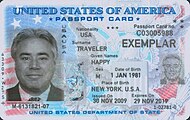U.S. passport
| United States passport | |
|---|---|

The front cover of a contemporary United States biometric passport.
|
|

Front of a United States Passport Card (2009).
|
|
| Date first issued | December 30, 2005 (diplomatic biometric passport booklet) 2006 (regular biometric passport booklet) |
| Issued by |
|
| Type of document | Passport |
| Purpose | Identification |
| Eligibility requirements | United States nationality |
| Expiration | normally 10 years after acquisition for people at least age 16; 5 years for minors under 16 |
| Cost |
Booklet: $135 (first)/$110 (renewal)/$105 (minors) Card: $55 (first)/$30 (when applying for or holder of a valid passport booklet)/$40 (minor)/$15 (minor, when applying for passport booklet) |
United States passports are passports issued to citizens and non-citizen nationals of the United States of America. They are issued exclusively by the U.S. Department of State. Besides passports (in booklet form), limited use passport cards are issued by the same organization subject to the same requirements. It is unlawful for U.S. citizens to enter or exit the United States without a valid U.S. passport or Western Hemisphere Travel Initiative-compliant passport-replacement document, or without an exception or waiver.
U.S. passport booklets are valid for travel by Americans to certain countries and/or for certain purposes though it may require a visa and the U.S. itself restricts its nationals from traveling to or engaging in commercial transactions in certain countries. They conform with recommended standards (i.e., size, composition, layout, technology) of the International Civil Aviation Organization (ICAO). There are five types of passport booklets; as well, the Department of State has issued only biometric passports as standard since August 2007, though non-biometric passports are valid until their expiry dates. United States passports are property of the United States and must be returned to the US Government upon demand.
By law, a valid unexpired U.S. passport (or passport card) is conclusive (and not just prima facie) proof of U.S. citizenship, and has the same force and effect as proof of United States citizenship as certificates of naturalization or of citizenship, if issued to a U.S. citizen for the full period allowed by law. U.S. law does not prohibit U.S. citizens from holding passports of other countries, though they are required to use their U.S. passport to enter and leave the U.S.
American consular officials issued passports to some citizens of some of the thirteen states during the War for Independence (1775–1783). Passports were sheets of paper printed on one side, included a description of the bearer, and were valid for three to six months. The minister to France, Benjamin Franklin, based the design of passports issued by his mission on that of the French passport.
...
Wikipedia
